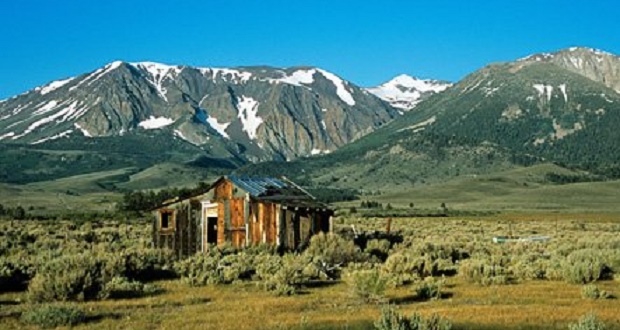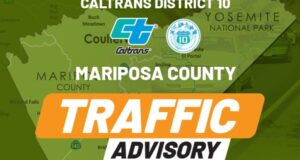Written by Dave Hubbard —
Tioga road lawsuits would smolder in court actions over many years before the issue of how this important route through Yosemite would be kept open. Traveling the road was definitely not for the faint of heart!
An early traveler on the Old Tioga Road would remark…
“The road is very rough in places, but is not impassable…and they did recommend a light wagon be used in attempting the route.”
Another wrote home…
“Fallen trees and washed-out roads had bothered us many times . . . but in no case had done more damage to us than to shorten our day’s journey by five or ten miles.”
Use of the Old Tioga Road often included unhitching the horses and transporting the wagon across difficult stretches with block and tackle attached to the nearby trees!
Travel on the Old Tioga Road was not an easy matter!
Officials Report On Road Conditions
Official reports described the condition of the overgrown road, saying that it had become no more than a footpath, and a difficult one at that.
The owner’s attorneys, in the defense of their client, admitted that though the road had not been kept in excellent condition, it was passable for its entire length by wagons as well as horse travelers.
And the war of words over the Old Tioga Road continued…
The Army Superintendent Takes Action
Yosemite’s Army park superintendents were especially vocal about the deplorable condition of the road…
In 1891, Captain A.E. Wood exhibited a refined sense of diplomacy in a report after becoming the first superintendent, stating that “although trees were down across the road and that it was badly washed in places…it made a good mounted trail, and as such is of much importance”.
Later reports from other superintendents would expand upon Captain Wood’s observations, and would urge the Interior Department to purchase the rights to the route. The road was worth salvaging and as Wood had pointed out, the original foundation “showed excellent work, and was intended to be permanent”.
The Ownership Dispute Continues
A bill affecting the Old Tioga Road that authorized the purchase of the various “toll roads” within Yosemite Park was considered by the House in 1896, but it never reached the floor for a vote.
Another harsh high sierra winter came and went, and the next year because of damage, the estimate to repair the old road had increased beyond the earlier estimates to $10,000.
In a report to his superiors, the Yosemite Superintendent was of the opinion that the old Tioga road was already government property by default stating that:
“This is not a toll road and never has been; it has been abandoned by the builders for more than twenty years; if they ever had any rights they lost them by abandonment.
The eastern half of the road is in such bad condition as to be hardly a good trail. I consider the Tioga Road the most important highway in the Park.”
Congress Orders An Inspection
In 1898 a bill was passed by Congress authorizing surveys for a new road from Yosemite Valley to Mono Lake that would replace the old Tioga Road, which by then was impassible.
By 1899 enough interest had been generated in the project that the Army was directed to clear the road to allow for a Congressional commission inspection.
The Army’s report contained an excellent description of the Tioga road and its condition at the turn of the century:
“The grades vary from 0 to 10 percent and the width from 10 to 20 feet. The road, however, was skillfully laid out and it may safely be said that most of it has a grade of only about 3 percent . . . it is exceedingly well built, the bridges having fine stone abutments, and there is a particularly well-built section of sea wall along the shore of Lake Tenaya.
But most of the original surfacing is gone and the road is obstructed in numerous places by fallen trees. It appears that no work in the way of maintenance has been done by the owner of the road for a number of years, though some slight work has been done by campers traveling over it.”
The final assessment was that the road was in fair condition, and its value was estimated to be $57,095.
It was also estimated that $2,000 would put the road back in its original condition. The recommendation was made that the Government should purchase the road as soon as it was practical to do so.
And Still Nothing Is Settled
The sinking of the battleship Maine, distracted the country once again, and though the bill to buy the Tioga Road was read in the House, it didn’t pass. A second bill was proposed in 1901 for the purchase of all toll roads within the Park for $208,000, but it too failed to pass.
But the issue was not dead…
In 1902 the Secretary of the Interior appointed a second committee to survey the Park’s toll roads, and their report urged immediate government control of all park roads.
And The Old Tioga Road Deteriorates
In a letter from Army Superintendent Major W. Forsythe to the Secretary of the Interior, the Major reported on the deteriorating condition of the road:
“Several wagons passed over the road last summer, … but also last summer I had to order a gratuitous issue of rations to a destitute family who were moving by wagon across the park from the east side by the Tioga Road because their team became exhausted on account of the difficult road and their food supply gave out before they could get through.”
Wilson and Wilson, the law firm representing the roads owners countered with the following…offering to the Secretary of the Interior an affidavit from their road superintendent stating:
“That said road is about 20 feet wide on an average and that teams may pass with convenience, with few exceptions, throughout the entire length of said road, and that in the opinion of this deponent said road is the best road that has ever been built on the Western Slope of the Sierra Nevada … ”
The War Of Words Goes To Court
Finally, in 1911 the Sierra Club issued a bulletin announcing the filing of a lawsuit. In their article under the heading “Old Tioga Road to be Acquired,” they announced that:
“The Government brought suit to condemn an unused toll road to make it part of the new system of roads through Yosemite National Park.”
The court battle over the old Tioga road had finally begun in earnest!
Depositions Are Heard
As the Tioga road law suits progressed, depositions were made. Mrs. H.R. Crocker of the Tioga road lodge known as Crocker’s Station, testified on behalf of the owners. She would testify that:
“Repair work was done in 1911 and the road opened as usual to travel. It has been opened and traveled by teams (both heavy and light wagons), people on horseback and pedestrians every year since its construction.
It has never been closed to travel, except when blocked by snow. It is still in fair condition with the exception of two or three places at Lake Tenaya and Yosemite Creek . . .”
The defendants attorneys pointed out that considerable sums had been expended on upkeep of the roads (though no documentation of the expenditures was ever made available), and that the franchise standards for the toll road of a 10 foot wide roadway had been lawfully maintained.
They also pointed out that the counties through which the road passed had always accepted the owners tax offerings. This they felt implied that all franchise conditions were being met.
When they were challenged further regarding its status as a toll road, the defendants explained that the reason that tolls had never been taken was that the road did not see enough travel to pay a man to be tollmaster.
It was their opinion that the United States Government had no claim to the road except by lawful and fair purchase.
Ironically, the tioga road lawsuit was never pressed to completion and the status of the road remained unresolved.
Then The Tune Begins To Change
Four years later the defendants lawyers reversed themselves. They noted that though the road had not been abandoned, that “we confess that the owners have been somewhat neglectful by reason of the slight travel upon the road.”
They then went on record urging the Government to purchase all of the park toll roads. As a parting shot they stated that “this would have already been done… but for the extreme difficulty of inducing Congress to spend money on any new project, especially one which necessitates a regular annual expenditure for maintenance.”
The Tioga Road Story finishes here: Mather’s Tioga Road
For more first-hand stories about growing up in Yosemite, visit Dave Hubbard’s website www.undiscovered-yosemite.com and like them on Facebook at www.facebook.com/ouryosemitefamily.
To read Dave Hubbard’s story, visit https://sierranewsonline.com/remembering-childhood-springtimes-in-yosemite/
For part one of this series click https://sierranewsonline.com/tioga-road-history-is-fascinating/
For part two of this series click https://sierranewsonline.com/sierra-silver-mines-and-the-tioga-road/
For part four of this series click https://sierranewsonline.com/the-mather-tioga-road-how-he-made-it-a-reality/







